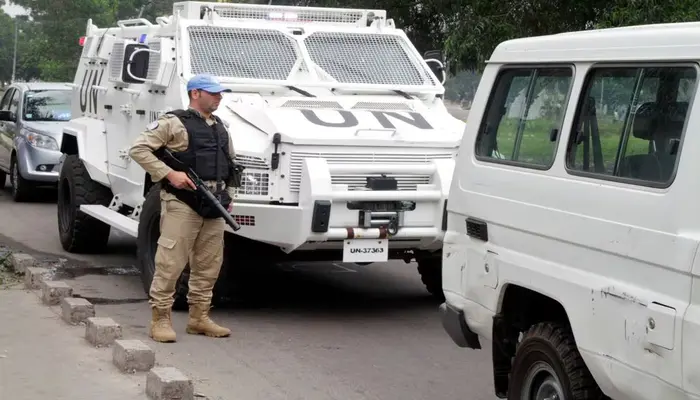
UN peacekeeping force to withdraw from Kamanyola base in eastern Congo. Image credit Via Reuters
DR Congo—United Nations peacekeeping force has begun to gradually evacuate from the conflict-fueled zone of the Democratic Republic of Congo on Wednesday.
According to a statement by the peacekeeping mission, the troops would hand over their base to Congolese authorities before their final exit from the area.
MONUSCO, the UN peacekeeping force, has been operating in Congo for over 13 years after replacing earlier U.N. troops in 2010 to help the country’s government combat insecurity in the eastern Congo.
The spiking conflict in the east of the Central African country, Congo, has been largely caused by popular armed groups fighting over resources and territorial advancement.
But the Congolese authorities have become weary of the presence of the 13,500 U.N. peacekeeping force due to its inability to protect civilians against the armed groups’ persistent attacks, which has as well led to serious protests.
Following a request for the mission’s withdrawal by the Congolese president, Feliz Felix Tshisekedi in September, the U.N. Security Council approved the end of the mission in December 2023r.
The MONUSCO base, established in 2005, according to the U.N will be managed by the Congolese national police.
“We hope that the handover of Kamanyola, combined with MONUSCO’s ongoing construction of the Congolese National Police sub-station, will serve as a model and inspiration for the rest of MONUSCO’s disengagement process,” Keita, who is a United Nations diplomat, said in a statement.
This first of three withdrawal phases will see about 2,000 troops leave 14 bases in South Kivu province by the end of April. The mission will later withdraw from the North Kivu and Ituri provinces in the next phases, Reuters reported.
However, security tensions remain unabated in the eastern area of the country as the Congolese army continue to resist the Rwandan-backed M23 Tutsi-led rebels
A report said the number of internally displaced people in North Kivu amounts to 1.6 million as of mid-February







